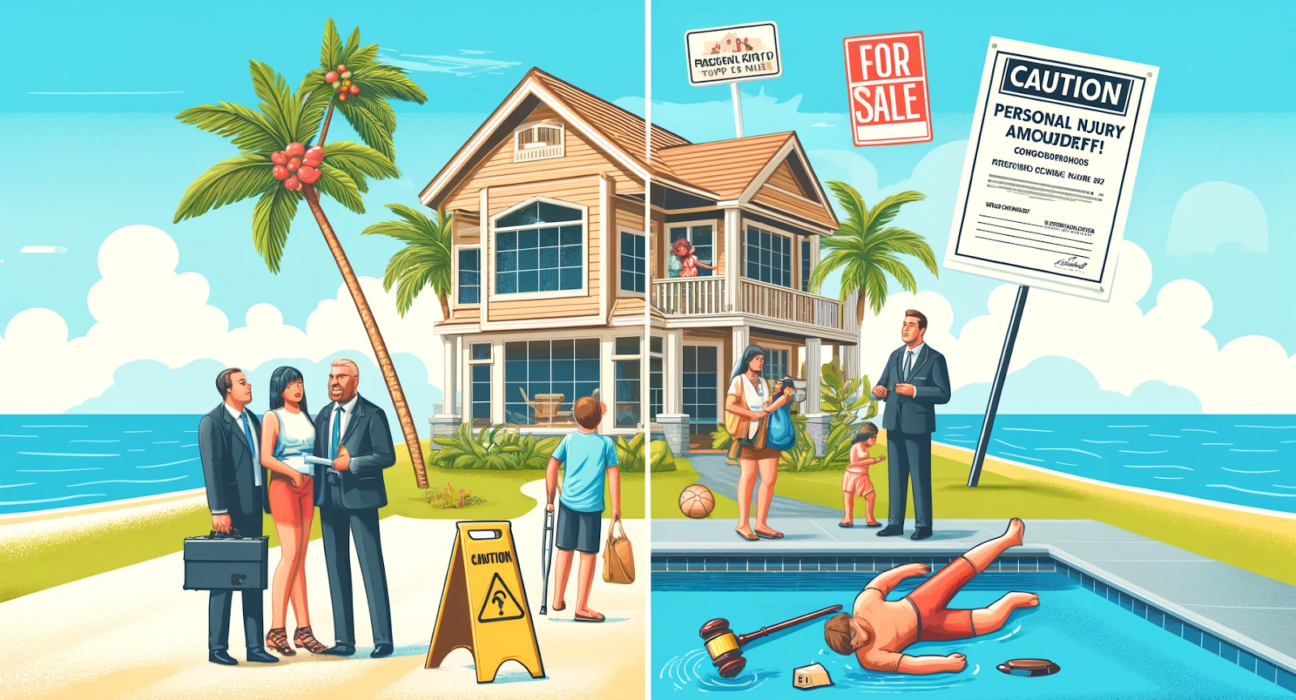Owning a second home in Florida can be an exciting investment and a great way to enjoy the Sunshine State. However, it also comes with its share of responsibilities, particularly when it comes to personal injury considerations. As a property owner, one must be aware of the potential risks and liabilities associated with accidents and injuries that could occur on their property.
Florida has specific premises liability laws that dictate the extent of a property owner’s responsibility when it comes to accidents on their property. These laws hold property owners responsible for providing a safe environment for any visitors to the property, whether they are guests or invitees such as renters. It’s essential to be familiar with these laws and take the necessary precautions to prevent personal injury accidents in your second home.
In addition to understanding the legal aspects, it’s crucial to maintain the property in good condition, addressing any hazards or potential dangers promptly. Regular inspections and necessary repairs can help minimize accidents on the property and the possibility of facing personal injury lawsuits. Ultimately, staying informed about the legal context and acting responsibly as a second-home owner in Florida can provide peace of mind and make the investment more enjoyable.
Understanding Second-Home Ownership in Florida
Types of Properties and Ownership Interest
When considering the purchase of a second home in Florida, it is essential to differentiate between a primary residence, a second home, and an investment property. A second home is typically used for personal enjoyment and may be rented out for part of the year, while an investment property is primarily used for income generation through renting. Ownership interest can also differ significantly between types of properties. In Florida, common ways to hold property include:
- Sole ownership: A single individual owns the property.
- Joint ownership: Two or more individuals own the property together. Joint ownership can be as tenants in common, joint tenants, or in the case of married couples, as tenants by the entirety.
- Life estate: One person has the right to use and possess the property during their lifetime, while the remainder of interest goes to another individual or entity upon their death.
- Trust: The property is held by a trustee who manages it for the benefit of one or more beneficiaries.
Tax Implications and Benefits
There are various tax implications associated with owning a second home in Florida. If the property is considered a second home, the owner can still enjoy some tax benefits, such as deducting mortgage interest and property taxes on their federal income tax returns. However, specific requirements must be met for these deductions, such as living in the home for a certain period during the year. In the case of investment properties, owners can generally depreciate the property and deduct expenses related to its management and maintenance.
Florida does not have a state income tax, but property taxes still apply. Homestead exemptions are available for primary residences, reducing property taxes. However, this exemption does not apply to second homes or investment properties.
Insurance and Liability Considerations
Second-home owners must also consider insurance and liability issues. Generally, a standard homeowners insurance policy covers personal property and liability protection for a primary residence. However, coverage and premiums may differ for a second home, especially if it is rented out, located in a high-risk area (flood, hurricane, etc.), or unoccupied for long periods.
In terms of liability, owning a second home in Florida may expose the owner to potential personal injury claims from guests or tenants. To minimize this risk, the property should be well-maintained, and hazardous conditions should be addressed promptly. Additionally, an umbrella liability policy could be a valuable investment to protect against significant claims.
Financing options for second homes in Florida include conventional mortgages, home equity lines of credit (HELOCs), or home equity loans. Typically, down payment requirements and interest rates are higher for second homes compared to primary residences. It is crucial to research and compare financing options to find the best fit for one’s circumstances.
Understanding the types of properties, tax implications, benefits, and insurance and liability considerations is essential for successfully purchasing and owning a second home in Florida. Proper planning and due diligence can help ensure a smooth and enjoyable experience for the owner.
Mitigating Risks and Maximizing Rewards
Managing Your Property and Planning for the Future
Owning a second home in Florida comes with both risks and rewards. Proper maintenance and management are crucial to protect your investment and prevent personal injury claims. Regular maintenance and repairs are essential to keep the property in good condition, avoid costly issues down the line, and ensure the safety of any occupants.
Considering the future of your property is important. Will it be a family home or a rental property? Factor in the potential for rental income and weigh the costs against the rewards. Make a detailed plan about the division of the property for your children or grandparents, if applicable. Keep all documents pertaining to the property organized and up to date.
Be aware of the tax implications of homeownership, including mortgage interest deductions, taxable estate, and utility costs. The Tax Cuts and Jobs Act has changed some rules, so be sure to consult with a financial advisor to maximize your tax breaks.
Legal Strategies for Protecting Your Asset
Asset protection and estate planning are critical for second-home ownership. Consider consulting with an estate planning attorney for a free consultation to guide your strategy. Establishing joint tenancy or tenants in common can protect your home from creditors and ensure a smooth transfer of ownership in the event of an unexpected situation.
For married couples, it’s essential to understand each spouse’s rights and equal share of the property. Joint tenants with a right of survivorship can provide a seamless transition of ownership without the need to go through probate. Discuss your vision for the property with your partner and ensure it aligns with your joint plans and goals.
In some cases, it may be prudent to set up a property management company to handle the day-to-day needs of your second home, such as finding and managing tenants and handling maintenance requests.
Mitigating risks and maximizing rewards for your second home in Florida requires careful planning, maintenance, and legal strategies. By following these steps, you can focus on enjoying your change of scenery and making lasting memories during your vacations.
In Conclusion
When considering second-home ownership in Florida, it’s essential to be aware of personal injury considerations that may arise. Homeowners must maintain their properties to ensure a safe environment for visitors. Negligence plays a significant role in Florida’s personal injury law and includes elements like duty of care, breach of duty, causation, and damages.
To protect themselves from potential legal issues, homeowners should be familiar with Florida’s premises liability laws. These laws mandate property owners to maintain their premises in a reasonably safe condition and protect invitees from possible hazards. Failure to oblige may result in responsibility for any personal injury damages.
In addition to premises liability, homeowners should be aware of how Florida’s comparative negligence system can affect personal injury cases. In this system, any financial compensation awarded to an injured party might be reduced if the injured person contributed to the accident. Understanding these legal nuances can help second-home owners in Florida make informed decisions and prevent potential legal disputes.
Lastly, it is recommended that second-home owners in Florida invest in adequate insurance coverage to protect themselves from any unforeseen incidents. This coverage can provide financial support in the event of a personal injury claim made against the property owner.
Being knowledgeable about personal injury considerations and taking necessary precautions can make second-home ownership in Florida a more secure and enjoyable experience.





